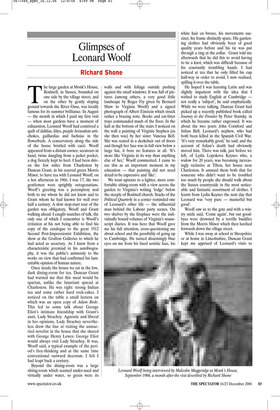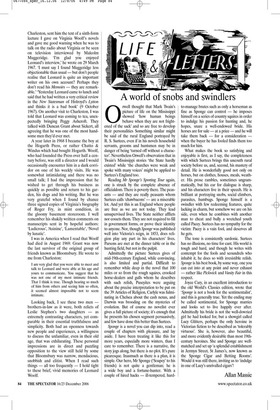Glimpses of Leonard Woolf
Richard Shone
The large garden at Monk’s House, Rodmell, in Sussex, bounded on one side by the village street, and on the other by gently sloping ground towards the River Ouse, was locally famous for its summer brilliance. In August — the month in which I paid my first visit — when most gardens have a moment of exhaustion, Leonard Woolf had contrived a quilt of dahlias, lilies, purple Jerusalem artichokes, gaillardias and fuchsias in the flowerbeds. A conservatory along the side of the house bristled with cacti. Woolf appeared from a distant corner, secateurs in hand, twine dangling from a jacket pocket, a dog fiercely kept to heel. I had been driven the few miles from Charleston by Duncan Grant, in his scarred green Morris Minor, to have tea with Leonard Woolf, on a hot afternoon in 1966. I was 17; the two gentlemen were sprightly octogenarians. Woolf’s greeting was a peremptory nod both to me whom he did not know and to Grant whom he had known for well over half a century. A slow stop-start tour of the garden was obligatory, Woolf and Grant walking ahead. I caught snatches of talk, the only one of which I remember is Woolf’s irritation at his not being able to find his copy of the catalogue to the great 1912 Second Post-Impressionist Exhibition, the show at the Grafton Galleries to which he had acted as secretary. As I knew from a characteristic jeremiad in his autobiography, it was the public’s animosity to the works on view that had confirmed his lamentable opinion of human nature.
Once inside the house we sat in the low, dark dining-room for tea. Duncan Grant had warned me that this meal would be spartan, unlike the luxuriant spread at Charleston. He was right: strong Indian tea and some rather hard rock-cakes. I noticed on the table a small lectern on which was an open copy of Adam Bede. This led to some talk about George Eliot’s intimate friendship with Grant’s aunt, Lady Strachey. Agnostic and liberal in her opinions, Lady Strachey nevertheless drew the line at visiting the unmarried novelist in the house that she shared with George Henry Lewes: George Eliot would always visit Lady Strachey. It was, Woolf said, a typical example of the period’s free-thinking and at the same time conventional outward decorum. I felt I had leapt back a century.
Beyond the dining-room was a large sitting-room which seemed under-used and virtually under water, so green were its walls and with foliage outside pushing against the small windows. It was full of pictures (among others, a very good little landscape by Roger Fry given by Bernard Shaw to Virginia Woolf) and a signed photograph of Albert Einstein which struck rather a bracing note. Books and cat-litter trays commanded much of the floor. In the hall at the bottom of the stairs I noticed on the wall a painting of Virginia Stephen (as she then was) by her sister Vanessa Bell. She was seated in a deckchair out of doors and though her face was in full view below a large hat, it bore no features at all. ‘It’s more like Virginia in its way than anything else of her,’ Woolf commented. I came to see this as an important moment in my education — that painting did not need detail to be expressive and ‘like’.
We went upstairs to a lighter, more comfortable sitting-room with a view across the garden to Virginia’s writing ‘lodge’ below the steeple of Rodmell church. Stacks of the Political Quarterly in a corner reminded one of Leonard’s other life — the influential man behind the Labour party scenes. On two shelves by the fireplace were the individually bound volumes of Virginia’s manuscript diaries. It was here that Woolf gave me his full attention, cross-questioning me about school and the possibility of going up to Cambridge. He turned disarmingly blue eyes on me from his lined semitic face, his white hair en brosse, his movements succinct, his frame distinctly spare. His gardening clothes had obviously been of good quality years before and his tie was put through a ring at the collar. Grant told me afterwards that he did this to avoid having to tie a knot, which was difficult because of his constantly trembling hands. I had noticed at tea that he only filled his cup half-way in order to avoid, I now realised, spilling it over the table.
He hoped I was learning Latin and was slightly impatient with the idea that I wished to study English at Cambridge not really a ‘subject’, he said emphatically. While we were talking, Duncan Grant had picked up a recently published book called Journey to the Frontier by Peter Stansky, in which he became rather engrossed. It was about the two poets John Cornford and Julian Bell, Leonard’s nephew, who had both been killed in the Spanish Civil War. ‘It’s very remarkably good,’ he said, and the account of Julian’s death had obviously moved him. There was talk, just before we left, of Lydia Lopokova Keynes who, a widow for 20 years, was becoming increasingly reclusive at Tilton, her house near Charleston. It amused them both that for someone who didn’t want to be troubled too much by people she should walk about the Sussex countryside in the most noticeable and fantastic assortment of clothes. I learnt from Lydia Keynes the next day that Leonard was ‘very pure — masterful but good’.
Woolf saw us to the gate and with a wintry smile said, ‘Come again’, but our goodbyes were drowned by a terrific backfire from the Morris Minor which then lurched forwards down the village street.
While I was away at school in Shropshire or at home in Lincolnshire, Duncan Grant kept me apprised of Leonard’s visits to Charleston, sent him the text of a sixth-form lecture I gave on Virginia Woolf’s novels and gave me good warning when he was to talk on the radio about Virginia or be seen on television interviewed by Malcolm Muggeridge. ‘I’m glad you enjoyed Leonard’s interview,’ he wrote on 29 March 1967. ‘I must say I found Muggeridge less objectionable than usual — but don’t people realise that Leonard is quite an important writer on his own account? Perhaps they don’t read his Memoirs — they are remarkable.’ ‘Yesterday Leonard came to lunch and said that he had written a very critical review in the New Statesman of Holroyd’s Lytton and thinks it is a bad book’ (9 October 1967). On another visit to Charleston, I was told that Leonard was coming to tea, unexpectedly bringing Peggy Ashcroft. They talked with Duncan Grant about Sickert, all agreeing that he was one of the most handsome men they’d ever met.
A year later in 1968 I became the boy at the Hogarth Press, or rather Chatto & Windus which had bought Hogarth. Woolf, who had founded the Press over half a century before, was still a director and I would occasionally encounter him in a dark corridor on one of his weekly visits. He was somewhat intimidating and there was no small talk; I had the impression that he wished to get through his business as quickly as possible and return to his garden, his dogs and his writing. But he was very grateful when I found by chance three signed copies of Virginia’s biography of Roger Fry, in mint condition, in the gloomy basement storeroom. I well remember his shakily written comments on manuscripts sent in by hopeful authors: ‘Ludicrous’, ‘Asinine’, ‘Lamentable’, ‘Novel by lunatic’.
I was in America when I read that Woolf had died in August 1969. Grant was now the last survivor of the original group of friends known as Bloomsbury. He wrote to me from Charleston:
I am very glad that you were able to meet and talk to Leonard and were able at his age and yours to communicate. You suggest that he was not one of my most intimate friends. That I think is true. Though hearing so much of him from others and seeing him so often, it seemed almost impossible not to seem intimate.
Looking back, I see these two men brothers-in-law as it were, both relicts of Leslie Stephen’s two daughters — as extremely contrasting characters, yet comparable in their essential truthfulness and simplicity. Both had an openness towards new people and experiences, a willingness to discuss the unfamiliar, even in their old age, that was exhilarating. These personal impressions are in direct and puzzling opposition to the view still held by some that Bloomsbury was narrow, mendacious, snobbish and elitist. When I read such things — all too frequently — I hold tight to these brief, vivid memories of Leonard Woolf.







































































































































 Previous page
Previous page